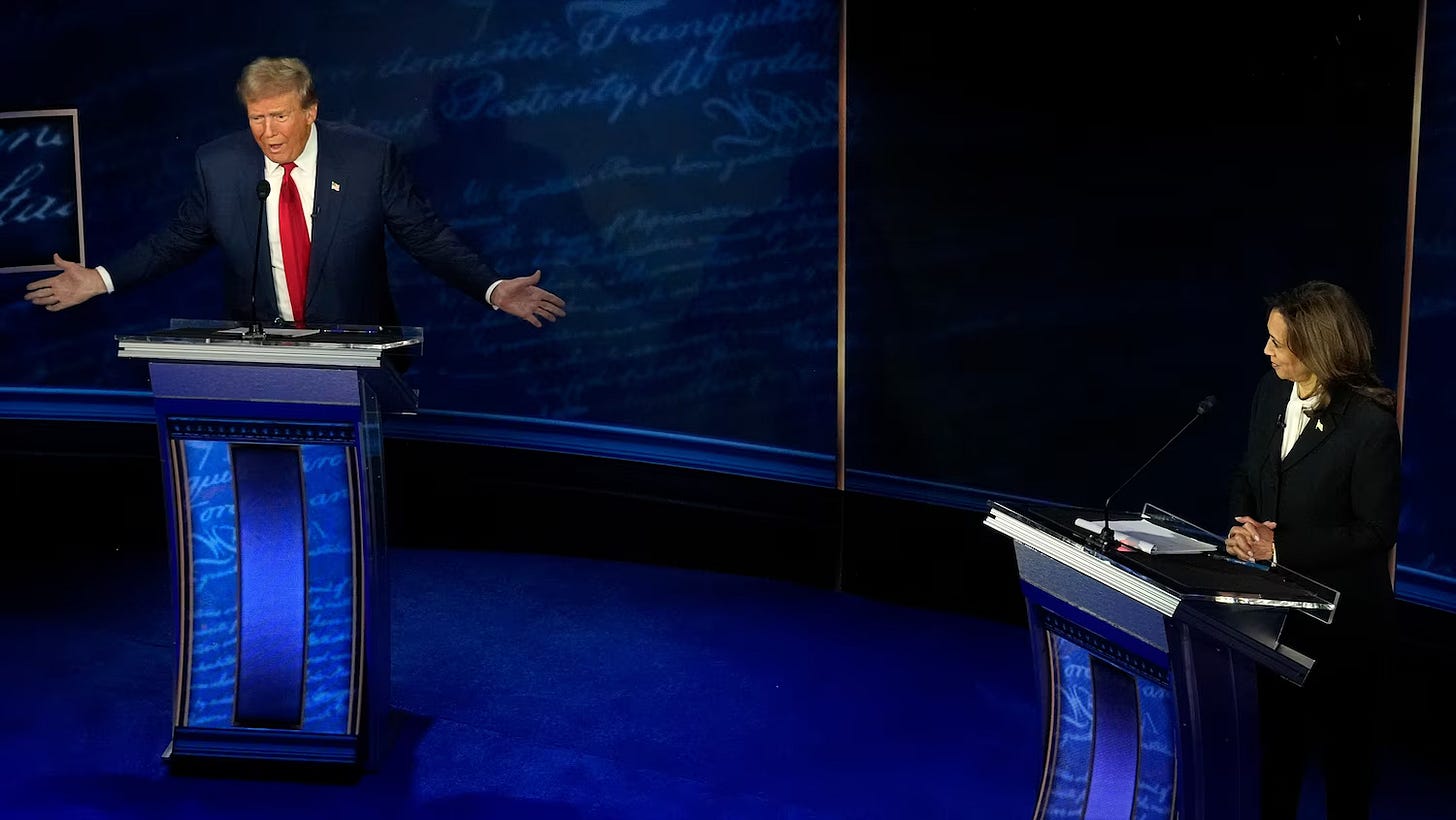A letter to open-minded right wingers
...
Way back in the bygone era of August 2024, I was a fledgling substacker1 and was writing commentary about the election. As Election Day loomed closer, substackers started publicly writing arguments for or against the candidates. One such “Substack war” was prompted by Hanania’s endorsement of Trump to which several other bloggers responded. My goal in my post was to categorize each blogger’s arguments, summarize the findings, and add some perspectives I believed were overlooked.
In broad strokes, I think that you could tell a story at the time where the Democratic party had many bad economic instincts.
For context, this was just after the Biden administration took a stronger Bernie-Warrenite stance against what they called “corporate greed” as a solution to inflation, as opposed to supply side reform. Additionally, Kamala released her proposal to ban price gouging in August, stirring controversy among moderates.
There are other examples, but I think they betray what is, at its core, an attempt to move the Democratic Party further away from the neoliberal consensus of the Obama era and closer to a new progressive synthesis, where taking down big business is seen as the key to unlocking a more abundant and equitable future.
I have at least some reasons for being skeptical of this. I recently said:
Broadly I’ve moved to the right on economics. When I was younger I made the classic mistake of thinking that something like minimum wage was an unalloyed good. With that topic and many others like it, I’ve moved to the right or lowered my confidence such that I basically copy paste my opinions from Clark Center Forum polls. Very generally I interpret this as placing me on the center right economically speaking.
While I have lowered confidence in general of the findings from the human sciences, economics is something I have higher confidence in because I personally consume less of something as it gets more expensive and more of it as it gets cheaper, so I have a high prior of econ-101 style thinking basically being correct.
This is the prior through which I view the Biden administration’s policies. I typically come away unimpressed with ideas like corporate greed, corporate concentration, and price gouging. In the back of my mind, I suspect the Bernie-Warrenite turn is a way to institute all sorts of clumsy legislation that will make the country poorer.
In another post, I further outlined my view that the economy matters more than cultural issues. I’d clarify now that I think culture is extremely important, but the culture war tends to focus on outlier cases that make for good discourse yet don’t amount to being more significant than the economy. If the parties were completely polarized on fertility for example, then I might think culture is more important than the economy, but with respect to things like Trans athletes, I don’t think so.
So coming in, I had multiple priors that advantaged supporting Trump. I thought the left had bad economic instincts and that the economy was more important than cultural questions. But one fact kept me from endorsing Trump and caused me to side with the Pro-Kamala Substack crowd.
The Smart Right Winger
I’ve spoken to several smart right wingers. I’ve read many of them. I have unironically read Curtis Yarvin and Richard Hanania is one of my favorite bloggers.
So I do like these people. In my engagement with smart right wingers, I think I have a pretty good mental model of how they come to the conclusion to support Trump and the Republican party.
What I think happens is that smart right wingers know a lot of factual information about a variety of topics in the discourse. But one thing stands out among the rest: they are reasonably good pattern matchers.
What I mean is that a smart right winger knows that there is a “Blue Tribe” and a “Red Tribe” in a broad sense. They also understand that the Blue Tribe as it were is in control of many of our nation’s institutions. Some left wingers will point out Fox Media or talk radio as being dominated by the right, but that’s not quite accurate. Any Yarvinite worth their salt should understand that radio and television news aren’t what influences elites, who for the most part read their information instead of listening or watching passively.
The New York Times, the medical establishment, the scientific community at large, the elite universities and the expert class in general are all blue coded. This is important because it matters to a great degree what these people think. This is essentially the cathedral as Yarvin eloquently puts it. I just call them our elite institutions.
So after realizing this, the smart right winger has a hard time reconciling facts they know to be true with the so-called facts our elite institutions propagate. Over the years we’ve watched the blue tribe cosign defunding the police, trans athletes in sports, new metaphysics involving gender, race-based college admissions and discriminatory hiring practices, and COVID school closures just to name a few.
In reaction the smart right winger cosigns Trump. Most of them buy into the idea that Trump can and should Dewokify our institutions, taking some inspiration from Germany’s Denazification program.
Our right winger signs his or her ballot to Trump, awaiting the day our nation returns to greatness.
The Left
This raises the question: just why are there so many bad ideas on the left? Smart right wingers will try to tell you a theory wherein the reason the left is home to so many western-civilization destroying theories like Marxism and Critical Race Theory is because they are actually out to destroy and replace western civilization with something else. While I suspect that some people on the left are trying to do this, I have a different answer.
My basic theory for why you see so many bad ideas pop up on the left is because the left as we know it is merely where intellectual discussion usually takes place.
Why is there no right-wing New York Times? No right-wing scientific institutions? Yarvin would have you believe that it’s because “power is conserved,” meaning that for there to be a right-wing New York Times, the current slate of institutions would have to deem it a legitimate authority. They would have to include The Right-Wing New York Times articles in their discourse as a place where true information comes from. They would have to share articles amongst themselves. Journalism professors would assign the RWNYT’s articles as homework. There would have to be pipelines from elite universities to work at the RWNYT and for well-known experts to write opinion articles there.
But this argument is too cute for me. For a smaller example, why is there no right Slow Boring? Yglesias could signal boost them as being a right wing counterpart to his own work, but would he? It’s an interesting question to think about.
And this I think gets at why there is actually no right Slow Boring. It’s because there is both less demand and supply for a critically deep right news ecosystem. The right tends to prefer modes of communication that lack depth for the sake of ease of consumption such as TV or radio, whereas there are enough people on the left that can read to support the large amount of deep daily coverage of complex topics that Slow Boring does. Or that The New York Times does etc., on the supply side, there are more people on the left that are capable of supplying this information than there are on the right. The level of communication that tends to appeal to the right is not suitable for scientific inquiry or accurate and detailed journalism.2
Intellectual discussion as it is positioned today is an activity that occurs for the most part on the left. If you have intellectual interests, you are at the very least to the left of the MAGA crowd. Leftness is in a sense synonymous with intellectual curiosity. And some of the most intellectually curious people of our time have had great ideas, and also bad ones! Ones that I heavily disagree with!
But that still puts me on the left. Why is there room on the left for people all the way from Communists to Neoliberals? From Bernie to Manchin? From Robert Reich to Larry Summers? From Freddie DeBoer to Matthew Yglesias? I hope one day the left includes Richard Hanania as well. The fact is that the left is a diverse ecosystem of intellectuals as well as people who want to masquerade as intellectuals.
Our elite institutions suffer from their own success. When you have something valuable going on, people rise up to challenge it from within its own ranks. Sometimes those bad ideas lose, but sometimes they win out. The price you pay for being the place for smart people to be is that smart people can sometimes come up with influential bad ideas.
But it would be foolish to throw the baby out with the bathwater. The key here is to compare the institutions we have not with a perfectly idealized version in theory, but with the real alternative.
MAGA is not a substitute
Trump has recently proposed across-the-board tariffs that are maligned by economists. The formula they used to calculate this is astounding.
And this gets to the heart of the problem. In my estimation, broadly what has basically happened is that through a series of historically contingent events, tribal reinforcement, and education polarization under Trump, the Left has become home to smart and informed voters. The Left is also home to many of our nation’s influential experts and intellectuals. The Right has in exchange gotten dumber and more out of control. The disciplining effect the business community and investors have on the Right’s worst impulses is muted. The right wing media ecosystem is filled with a headache inducing amount of lies and misinformation, and our medical institutions are being hollowed out and replaced with sycophants.
Many point out that if far leftists were successful in alienating men and jews, they would basically decapitate the intellectual basis of their movement. What’s interesting is that MAGA has succeeded where the left failed on an even greater scale: they’ve alienated most morally upright educated voters and experts.
What I think this episode shows is that there is no substitute for a careful consideration of policy discussion. With no smart people in the room left to check him, we have empowered a mad king to destroy the country and our institutions on the basis that they’ve gotten some things wrong over time, and on the flawed characterization that our institutions are irredeemably corrupt because bad ideas float in the soup of liberal democracy. The scope and scale of missteps by the liberal establishment deserve scrutiny and course correction, not total mayhem.
I think this goes to show just how hard replacing the liberal establishment really is. It takes more work than electing some rogue oligarchs to fire government employees, or allowing one corrupt man to place American companies under his thumb so they can beg for exemptions from his terrible policy.
People love to say “short-term pain for long-term gain.” That’s an interesting point as far as tariffs are concerned. But as far as liberal democracy goes, our institutions weren’t built overnight. Perhaps they will emerge stronger from the wreckage.
Perhaps they won’t.
Still am.
Dr. Oz is one such example of how to make science appeal to the right.






Maybe this is my "OK Boomer" moment, though I don't think I'm technically a Boomer -- I was born in the mid sixties, so I'm about Kamala's age.
When I was a Young Right-Winger in the 80s, conservatives were, if anything, nerdy and bookish intellectual types, very interested in ideas. College age conservatives actually read books. Things like The Conservative Mind: From Burke to Eliot, by Russell Kirk, things by Irving Kristol (who was much smarter than his warmongering son), The Austrians like Hayek and von Mises (yes, I actually read Human Action in college, for fun.). Thomas Sowell, who was already a towering intellectual figure.
As somebody who came to "the Right" via the libertarian route, I literally had copies of Milton Friedman's Capitalism and Freedom" and Ayn Rand's "Atlas Shrugged" on the bedside table. To a large extent, the conservative movement in America prior to Trump was kind of the opposite of the online "own the libs" thing we've got going on now. When I engaged and debated my classmates in college and law school, my goal was to persuade them of the rightness of my clearly correct views, not to own or humiliate them.
Of course, when I was younger many on the left were willing to engage in open debate.
I'll add that I just don't get the nice words for Curtis Yarvin. I don't think he should be canceled or exiled or anything, but I do not see the appeal. He takes 1,000 words what could be said in ten, and his main theory -- authoritarian rule dressed up as "monarchy" -- is neither conservative nor particularly likely to succeed in practice. Authoritarian states tend to be neither free nor prosperous, and no, Singapore proves only that you can get lucky, not that authoritarianism is likely to lead to success in the general case.
This is a really interesting perspective. I remember a right wing friend of mine using the fact that there is only one Fox News to 10 CNNs as evidence of left wing media bias, I like this conclusion more. Where can a right winger find intellectual, open-minded right wing thinkers now?